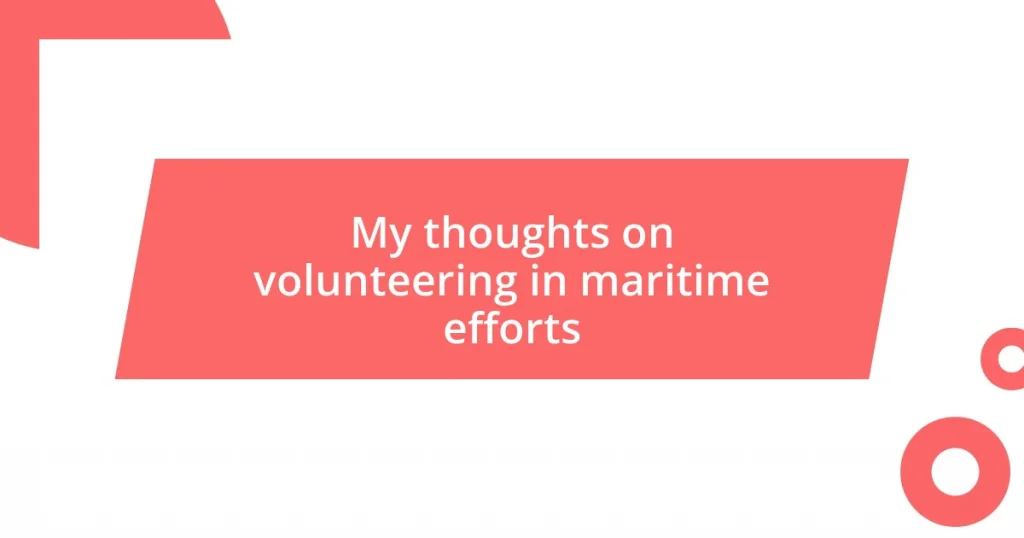Key takeaways:
- Maritime volunteering fosters personal growth through teamwork and skills acquisition, leading to deep connections and fulfillment.
- Various opportunities exist, including beach cleanups, wildlife rescue, and educational outreach, enhancing marine conservation efforts.
- Challenges such as weather unpredictability and physical demands require resilience and effective communication for successful volunteering experiences.
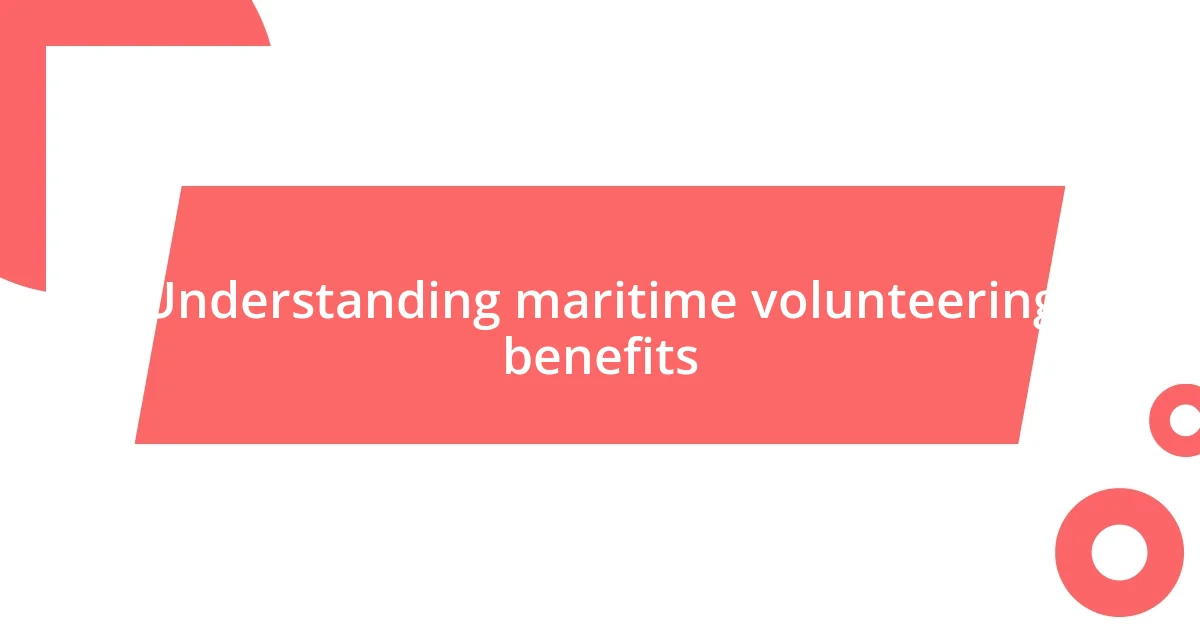
Understanding maritime volunteering benefits
Volunteering in maritime efforts is a powerful way to connect with our oceans and communities. I remember the first time I joined a beach cleanup crew; the sheer joy of pulling plastic from the shore made me realize how my small actions could contribute to something much larger. Isn’t it fascinating how each piece we collect represents a step toward preserving marine life?
One of the most rewarding aspects is witnessing the direct impact of our work. During a recent marine wildlife rescue, I saw firsthand how our teamwork saved the life of a stranded seal. That moment filled me with a sense of fulfillment I had rarely experienced. Have you ever felt that rush of purpose when you know you’re making a difference?
Additionally, maritime volunteering offers invaluable opportunities for personal growth. I’ve gained skills in navigation and teamwork, all while making lasting friendships with people who share my passion for the ocean. Sharing experiences with like-minded individuals not only enriches our journeys but also fosters a supportive community. Isn’t it inspiring to think about the connections you can create while doing something meaningful?
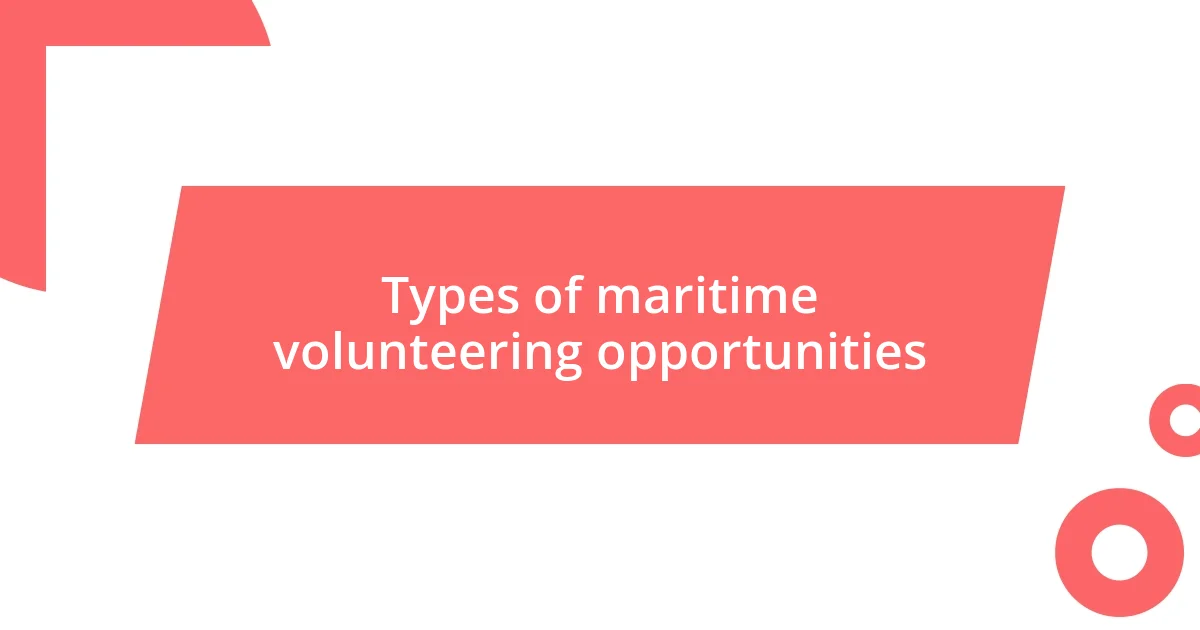
Types of maritime volunteering opportunities
There are various types of maritime volunteering opportunities that cater to different interests and skills. Whether you’re passionate about conservation, education, or hands-on rescue efforts, there’s something for everyone. I remember volunteering for a local nonprofit that focused on coral reef restoration, where I not only learned about marine ecosystems but also got to snorkel among vibrant corals—a personal highlight.
Here’s a list of some maritime volunteering opportunities that you might consider:
- Beach Cleanups: Organize or join efforts to remove trash from shores, improving the environment for wildlife.
- Marine Wildlife Rescue: Engage in activities like rescuing stranded animals or rehabilitating injured marine creatures.
- Research and Conservation Projects: Help scientists collect data on marine biodiversity or participate in habitat restoration initiatives.
- Sailing and Navigation Programs: Learn sailing skills while assisting in voyages focused on marine education and conservation.
- Educational Outreach: Volunteer at marine sanctuaries or aquariums to teach the public about ocean conservation and marine life.
- Dive Programs: If you’re a certified diver, assist in underwater cleanups or coral reef monitoring.
Each of these roles not only supports our oceans but can also transform your perspective on marine stewardship. When I participated in a research project on dolphin behavior, the experience was eye-opening; observing these incredible animals up close deepened my commitment to protecting their habitats.
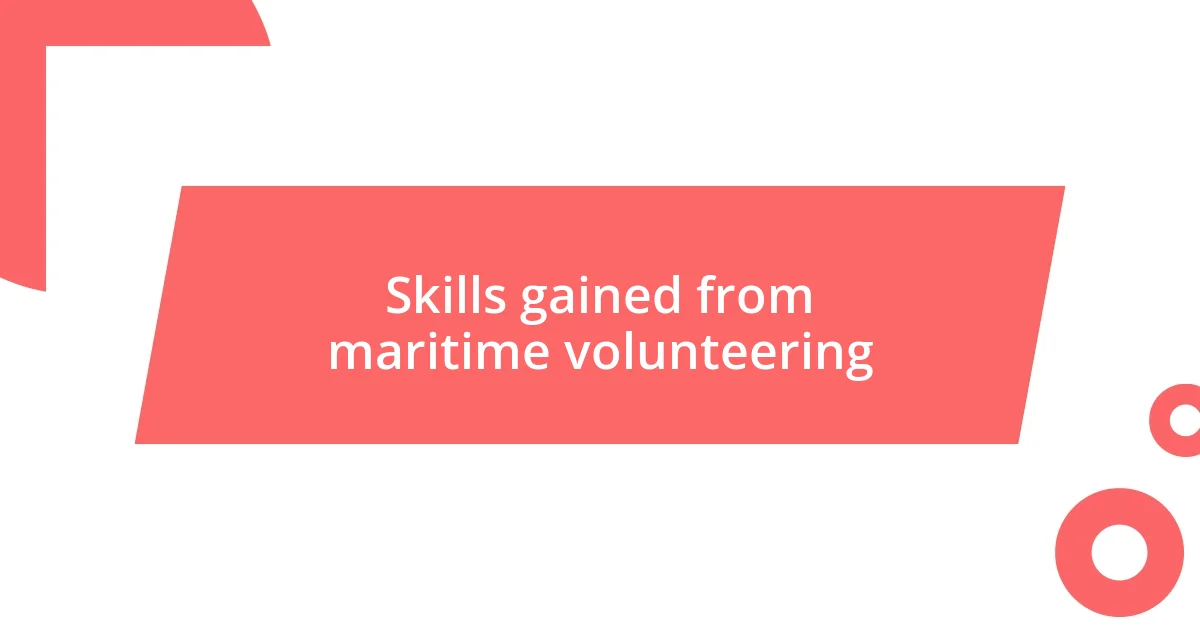
Skills gained from maritime volunteering
To me, one of the most significant skills gained from maritime volunteering is problem-solving. During a boat restoration project, I encountered unexpected challenges, like repairing a stubborn hull leak. Collaborating with experienced volunteers, I learned to think on my feet, adapt our approach, and ultimately overcame the obstacle. That experience truly highlighted how crucial critical thinking is in real-world situations.
Moreover, volunteering in this field has honed my communication skills. Working with a diverse group of people requires clarity and understanding. I remember leading a small team during a marine debris survey. Ensuring everyone understood their roles while staying motivated was key. The satisfaction of achieving our goals together reinforced the importance of effective communication in teamwork.
Lastly, maritime volunteering cultivates a strong sense of leadership. On one occasion, I coordinated a fundraising event for marine conservation. Organizing logistics, rallying support, and inspiring volunteers to join me was challenging yet rewarding. This experience showed me that taking initiative can drive meaningful change, both for our community and our oceans.
| Skill | Example Experience |
|---|---|
| Problem-Solving | Overcame a hull leak during boat restoration. |
| Communication | Led a team during a marine debris survey. |
| Leadership | Coordinated a fundraising event for marine conservation. |
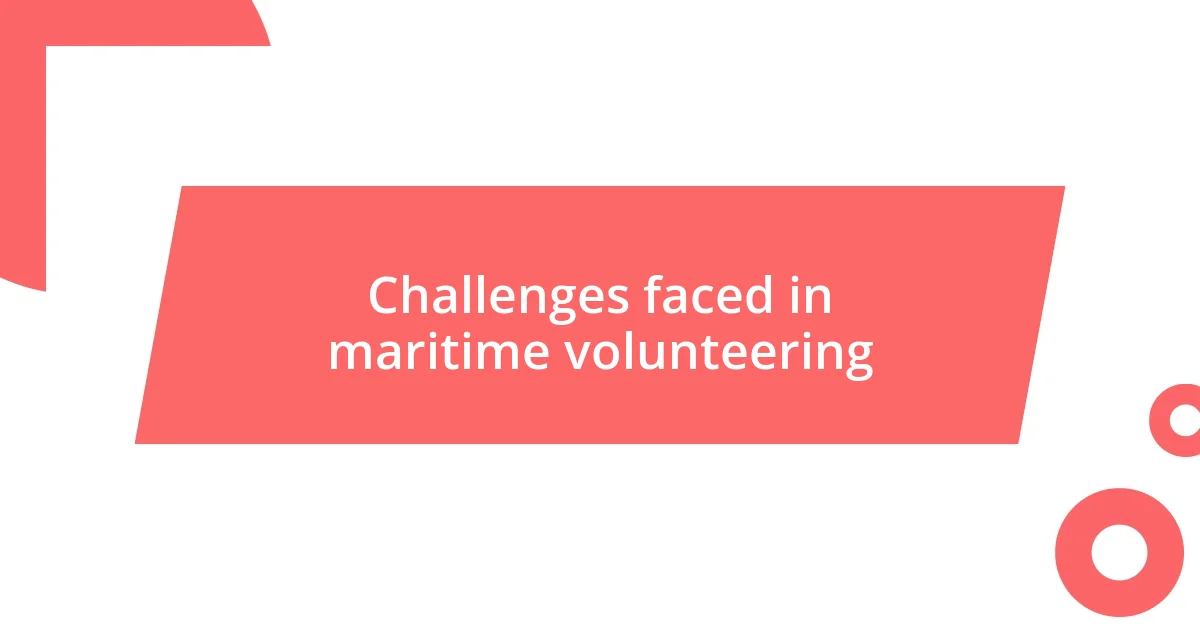
Challenges faced in maritime volunteering
One of the primary challenges in maritime volunteering is the unpredictable nature of weather conditions. I recall a time when my team organized a beach cleanup, only to be met with sudden rain and strong winds. It made me realize how quickly plans can change, forcing us to adapt on the fly. Have you ever had your plans thwarted by nature? It’s frustrating but also a lesson in resilience and flexibility.
Another significant hurdle I faced was the physical toll that volunteering can take. From hauling heavy gear to working long hours under the sun, it can be exhausting. I remember feeling utterly drained after a day of marine wildlife rescue, watching a beautiful sea turtle struggle. The gratitude I felt when we eventually released it back into the ocean made it worth every drop of sweat, but it was a stark reminder that this work isn’t just mentally stimulating—it can be physically demanding as well.
Additionally, navigating the complexities of teamwork can pose a challenge. I’ve experienced moments where miscommunication led to inefficiencies during a research project. It was during a long day at sea, and tempers flared as we struggled to align our goals. Reflecting on that experience taught me the importance of patience and active listening; without them, our collective mission can easily become derailed. Have you faced similar issues in collaborative efforts? It’s a common struggle, but it often leads to personal growth and stronger bonds within the team.
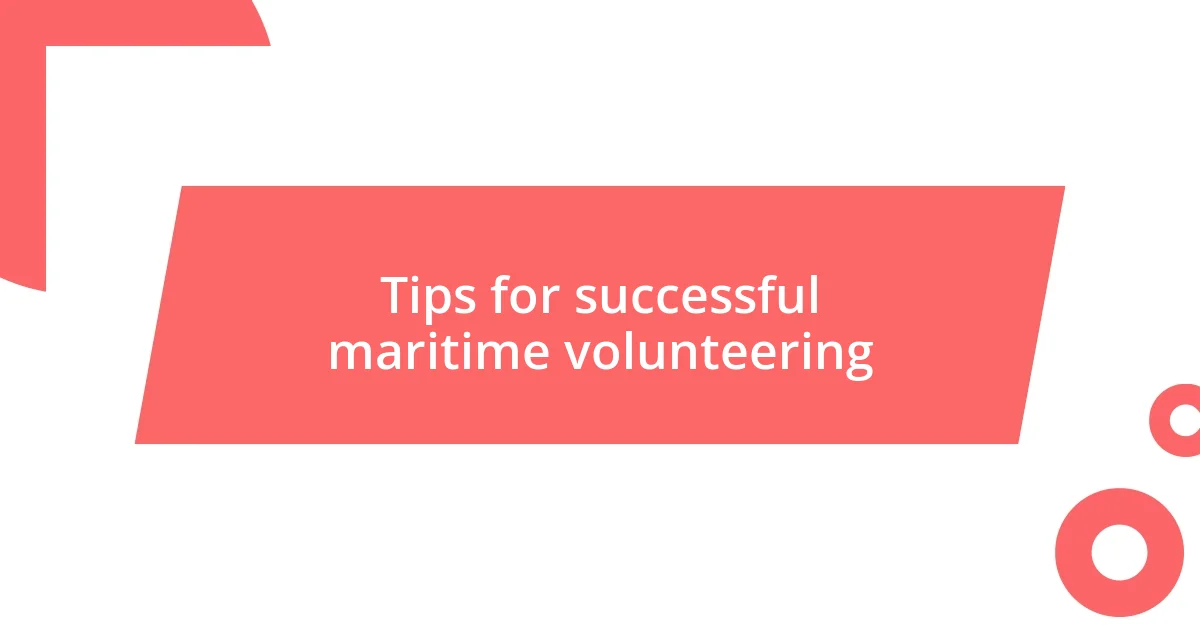
Tips for successful maritime volunteering
When embarking on a maritime volunteering journey, it’s essential to come prepared with the right mindset. I learned this lesson the hard way during my first offshore clean-up when I underestimated the amount of gear we needed. I remember feeling overwhelmed by the chaos at the start, realizing that a little forethought can make such a difference. Packing the essentials, like sunscreen, appropriate clothing, and plenty of water, can transform a challenging day into a rewarding one. Have you ever found yourself unprepared? It can dampen the enthusiasm, so always plan ahead!
Building relationships within the team is another key aspect of successful maritime volunteering. I’ve found that sharing meals or small moments between tasks can foster camaraderie. For instance, during a week-long project, my team celebrated little victories—like spotting a rare bird or completing a difficult task. Those shared experiences not only strengthened our bonds but also kept our spirits high, making the hard work feel lighter. Isn’t it amazing how connections can invigorate our efforts, turning a mere assignment into a memorable adventure?
Lastly, embracing the learning process is crucial. When I first volunteered to help with marine research, I grasped only a fraction of what was happening around me. I felt out of my depth and worried that my contributions weren’t meaningful. Yet, as I asked questions and actively engaged with seasoned volunteers, I found that everyone was eager to share their knowledge. I realized that the willingness to learn and grow, rather than striving for perfection, is what truly matters. Have you ever held back from participating due to self-doubt? Remember, every bit of effort counts in our collective mission!










